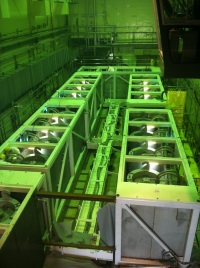Japan's Ministry of Economy, Trade and Industry (METI) has awarded US-based waste management specialist Kurion a JPY 1 billion ($10 million) grant to demonstrate technology to remove tritium from contaminated water for possible deployment at Fukushima.
 |
| Kurion's existing water treatment system is already in operation at Fukushima (Image: Kurion) |
Kurion's technology is one of three selected by METI in August to go forward to the demonstration phase, alongside offerings from GE Hitachi Nuclear Energy Canada and Russia's FSUE Radioactive Waste Management Enterprise (RosRAO).
Kurion president John Raymont said the demonstration project would begin immediately at the company's detritiation facility which is located in Houston, Texas.
Tritiated water is a significant issue at the Fukushima site, where more than 400,000 tons of contaminated water is stored in tanks and a further 400 tons accumulate on a daily basis. Two systems are already in place to remove contaminants from the stored water - a multi-nuclide removal system known as ALPS, and a Kurion's own mobile processing system known as KMPS. These systems remove contaminants that are suspended or dissolved in the water, but do not remove tritium.
Tritium is an isotope of hydrogen and presents a different problem to other contaminants as it forms tritiated water. A molecule of normal water contains two atoms of hydrogen and one of oxygen, but in a molecule of tritiated water, one of those hydrogens has been replaced with tritium. Industrial processes exist to remove tritium from heavy water. Such processes are used to remove tritium from the heavy water coolant and moderator used in Candu reactors, but are too expensive to be viable for use in removing tritium from the Fukushima waste water or from operating light-water reactors.
The demonstration projects announced by METI earlier in the year must both verify the tritium separation technology and also to assess the construction and operating costs for full-scale implementation of the technology at the Fukushima Daiichi plant. The technology must be capable of removing tritium from water with concentrations of 0.6 and 4.2 million bequerels per litre and to be expandable to process more than 400 cubic metres per day.
Researched and written
by World Nuclear News






_15863.jpg)







